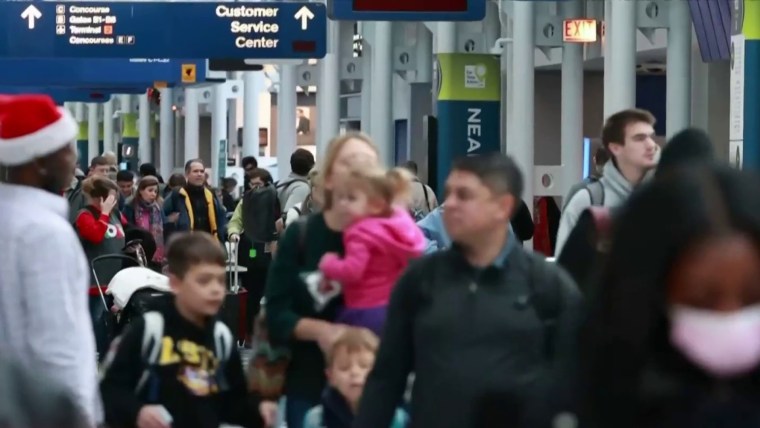The Deadly winter storm It killed at least 28 people and caused travel chaos across the United States, creating a “life-threatening hazard” for those traveling or working outside on Christmas Day, forecasters warned Sunday.
“In some areas, being outdoors can lead to freezing temperatures within minutes,” the National Weather Service said in a statement Bulletin.
“If you must travel or be outdoors, prepare for extreme cold by dressing in layers, covering exposed skin as much as possible, and packing winter protective gear in your vehicles,” it added.
The storm, stretching from the Great Lakes near Canada to the Rio Grande on the Mexican border, has killed at least 28 people in recent days across the United States, NBC News reported. Deaths were reported in Colorado, Kansas, Oklahoma, Nebraska and New York, among other states.
Four people died Saturday in a three-vehicle crash on an interstate highway in Ohio and at least three more in Buffalo, including two who suffered medical emergencies at their homes and could not be saved because emergency crews could not reach them. Historical blizzard conditions.
As of Saturday, forecasters said the city had accumulated 28 inches of snow. Last month, areas south of the city recorded six feet of snow from just one storm.
New York Gov. Cathy Hochul said Friday that every fire truck in the city was stuck in the snow as she urged residents to “pack up, stay indoors and stay safe this weekend.”
The city’s international airport was also closed.
Blinding blizzards, freezing rain and bitter cold knocked out power in places from Maine to Seattle, leaving hundreds of thousands of homes and businesses without power and millions of people on edge over the possibility of outages.
The start of the NFL’s Tennessee Titans game in Nashville was delayed by an hour due to a planned power outage.
Power was restored, but by early Christmas Day, 250,000 homes were without power, including nearly 100,000 across Maine, according to the website Poweroutage.us.
National Grid, which serves customers in New York and Massachusetts, on Saturday asked its customers in Brooklyn, Queens, Staten Island and Long Island to reduce their natural gas use until Sunday afternoon.
Thousands of flights were also canceled as people tried to return home for Christmas. On Sunday, at least 1,200 flights were canceled across the country, leaving last-minute holiday travelers stranded.
Climate change may be responsible in part for the increase in snowfall, according to Environmental Protection Fund“A warmer planet evaporates more water into the atmosphere.”
“That moisture means more precipitation in the form of heavy snow or rain,” it said on its website.
“During the warmer months, this can cause unprecedented flooding. But in winter – when our part of the world is away from the sun – temperatures drop, and we can get massive winter storms instead of rain,” it added.
Meanwhile, “conditions are expected to improve slowly as the system weakens,” the NWS said. But by Sunday it said it would “continue to filter cold Canadian air into the eastern two-thirds of the country.”
It said “severe lake-effect snow, gusty winds and reduced visibility” will continue downwind of the Great Lakes and “bitter conditions” across much of the country.
“Lake-effect snow may persist into Christmas Day with locally blizzard conditions,” it added.
Associated Press Contributed.
